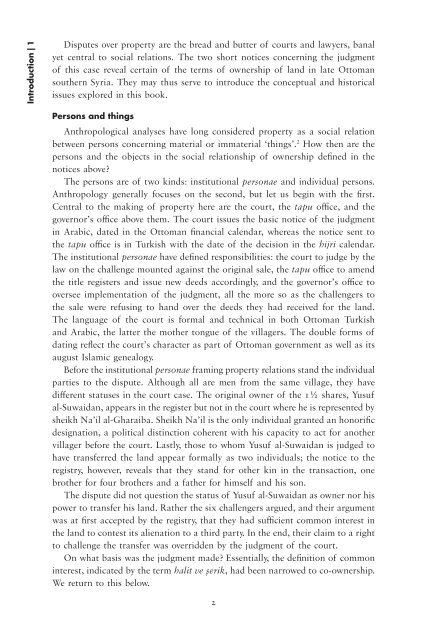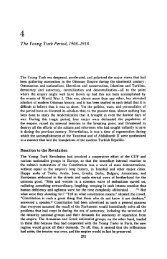Governing property, making the modern state - PSI424
Governing property, making the modern state - PSI424
Governing property, making the modern state - PSI424
You also want an ePaper? Increase the reach of your titles
YUMPU automatically turns print PDFs into web optimized ePapers that Google loves.
Introduction | 1<br />
Disputes over <strong>property</strong> are <strong>the</strong> bread and butter of courts and lawyers, banal<br />
yet central to social relations. The two short notices concerning <strong>the</strong> judgment<br />
of this case reveal certain of <strong>the</strong> terms of ownership of land in late Ottoman<br />
sou<strong>the</strong>rn Syria. They may thus serve to introduce <strong>the</strong> conceptual and historical<br />
issues explored in this book.<br />
Persons and things<br />
Anthropological analyses have long considered <strong>property</strong> as a social relation<br />
between persons concerning material or immaterial ‘things’. 2 How <strong>the</strong>n are <strong>the</strong><br />
persons and <strong>the</strong> objects in <strong>the</strong> social relationship of ownership defined in <strong>the</strong><br />
notices above?<br />
The persons are of two kinds: institutional personae and individual persons.<br />
Anthropology generally focuses on <strong>the</strong> second, but let us begin with <strong>the</strong> first.<br />
Central to <strong>the</strong> <strong>making</strong> of <strong>property</strong> here are <strong>the</strong> court, <strong>the</strong> tapu office, and <strong>the</strong><br />
governor’s office above <strong>the</strong>m. The court issues <strong>the</strong> basic notice of <strong>the</strong> judgment<br />
in Arabic, dated in <strong>the</strong> Ottoman financial calendar, whereas <strong>the</strong> notice sent to<br />
<strong>the</strong> tapu office is in Turkish with <strong>the</strong> date of <strong>the</strong> decision in <strong>the</strong> hijri calendar.<br />
The institutional personae have defined responsibilities: <strong>the</strong> court to judge by <strong>the</strong><br />
law on <strong>the</strong> challenge mounted against <strong>the</strong> original sale, <strong>the</strong> tapu office to amend<br />
<strong>the</strong> title registers and issue new deeds accordingly, and <strong>the</strong> governor’s office to<br />
oversee implementation of <strong>the</strong> judgment, all <strong>the</strong> more so as <strong>the</strong> challengers to<br />
<strong>the</strong> sale were refusing to hand over <strong>the</strong> deeds <strong>the</strong>y had received for <strong>the</strong> land.<br />
The language of <strong>the</strong> court is formal and technical in both Ottoman Turkish<br />
and Arabic, <strong>the</strong> latter <strong>the</strong> mo<strong>the</strong>r tongue of <strong>the</strong> villagers. The double forms of<br />
dating reflect <strong>the</strong> court’s character as part of Ottoman government as well as its<br />
august Islamic genealogy.<br />
Before <strong>the</strong> institutional personae framing <strong>property</strong> relations stand <strong>the</strong> individual<br />
parties to <strong>the</strong> dispute. Although all are men from <strong>the</strong> same village, <strong>the</strong>y have<br />
different statuses in <strong>the</strong> court case. The original owner of <strong>the</strong> 1½ shares, Yusuf<br />
al-Suwaidan, appears in <strong>the</strong> register but not in <strong>the</strong> court where he is represented by<br />
sheikh Na’il al-Gharaiba. Sheikh Na’il is <strong>the</strong> only individual granted an honorific<br />
designation, a political distinction coherent with his capacity to act for ano<strong>the</strong>r<br />
villager before <strong>the</strong> court. Lastly, those to whom Yusuf al-Suwaidan is judged to<br />
have transferred <strong>the</strong> land appear formally as two individuals; <strong>the</strong> notice to <strong>the</strong><br />
registry, however, reveals that <strong>the</strong>y stand for o<strong>the</strong>r kin in <strong>the</strong> transaction, one<br />
bro<strong>the</strong>r for four bro<strong>the</strong>rs and a fa<strong>the</strong>r for himself and his son.<br />
The dispute did not question <strong>the</strong> status of Yusuf al-Suwaidan as owner nor his<br />
power to transfer his land. Ra<strong>the</strong>r <strong>the</strong> six challengers argued, and <strong>the</strong>ir argument<br />
was at first accepted by <strong>the</strong> registry, that <strong>the</strong>y had sufficient common interest in<br />
<strong>the</strong> land to contest its alienation to a third party. In <strong>the</strong> end, <strong>the</strong>ir claim to a right<br />
to challenge <strong>the</strong> transfer was overridden by <strong>the</strong> judgment of <strong>the</strong> court.<br />
On what basis was <strong>the</strong> judgment made? Essentially, <strong>the</strong> definition of common<br />
interest, indicated by <strong>the</strong> term halit ve şerik, had been narrowed to co-ownership.<br />
We return to this below.<br />
2












